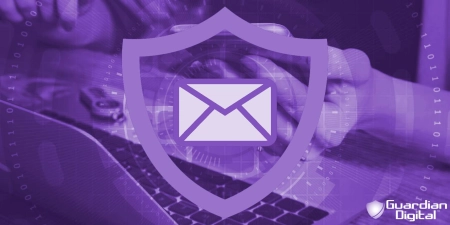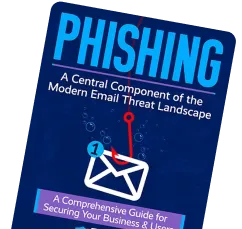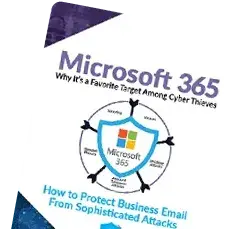Hackers execute business email compromise (BEC) schemes against large companies with alarming frequency. In July 2025, a Singapore-based shipping firm fell victim to BEC when they received a message from a fraudulent email account posing as one of their suppliers. The shipping firm failed to realize the deception until after it had sent a $42.3 million payment to a bank account controlled by the hackers. Fortunately, INTERPOL was able to recover about $41 million after they reported this incident, but that’s still a situation that no company wants to be in. Not everyone can afford to lose over a million dollars.
If you are running a small-to-midsize business, it’s more critical than ever to have the best email security tools and policies to ensure that your company can go up against the boldest cyberattacks.
Let’s unpack what email security means today, why business email security matters, and how to protect yourself from hackers in the worst-case scenario.
What is Email Security?
Email security is not just about malware scanners and a strong gateway for your inbox. It encompasses a holistic security mindset that anticipates data breaches and prepares you to control what happens afterwards.
Businesses should make email security a regular part of their operations. First, identify what your potential weaknesses are. Then, plan against a cyberattack that could exploit these vulnerabilities. It also pays to make sure everyone in your organization knows how to:
- Manage their passwords and safely authenticate inbox users
- Check email links and attachments before opening
- Identify the signs of common scams, like phishing attacks, ransomware, and BEC
If your team understands these email security basics, they will be able to monitor risks and respond with confidence.
Why is Email Security Important?
Threat actors target email because it is a preferred method of communication for confidential business information. They understand how harmful their attacks can be for a company, as significant downtime, reputational damage, and financial loss are only a few of the unfortunate results of successful email security breaches.
Ransomware was involved in 44% of all breaches analyzed, representing a significant increase compared to last year’s findings. We must consider this risk when using email for daily business operations and communication.
Email security doesn’t just safeguard data. It’s also about trust, continuity, and operational integrity. Companies must prioritize business email security as part of their broader efforts to cement a brand identity. Ideally, every company should be backed by cloud email security that proactively monitors and defends communication channels.
Common Email Security Risks and Solutions
Cloud email security offers many benefits to businesses. Here is how integrated business email security services counteract the risks of a cyberattack:
- Advanced threat detection and prevention: Integrating a malware URL scanner and other email detection services into a system can help companies immediately stop emails that carry ransomware, spyware, and all sorts of other hidden viruses.
- Simplified email management: Ensuring you have the latest security updates in an easy-to-access format, so you can focus on important tasks without missing any upgrades.
- Email threat blocking: Prevent attacks from ever reaching your system by implementing services that combat all phishing email attacks and malware scams that could lead to harmful, lasting damage. This reduces your data breach risk and keeps clients safe.
Email security is vital for more than simply avoiding attacks; it's also about making sure that work can go on safely, without unneeded stress. That’s why companies need to establish a full email security plan that changes as the threats change.
Building an Effective Email Security Strategy
You can adopt these techniques to ensure you have consistent email security throughout your business networks:
Don’t Rely on Built-in Email Security
Your business email client probably doesn’t offer the strongest protection and lacks features that may leave you vulnerable. Every email client's defenses should be supplemented by a third-party email security service.
Add More Layers of Email Security
Browser-based phishing and malware scanners can give your business email additional protection against. It’s key to build multiple lines of defense against email attacks.
Business Email Security Authentication Protocols
Combat email spoofing, impersonation attacks, and CEO fraud issues like Business Email Compromise by having a multi-factor or two-factor authentication method.
Email Security Training
Your employees need regular training to stay alert to the latest email security threats. Teach them what to look for and how to react if a cyberattack is detected.
Enforce Strong Email Passwords
Establish a strong password protocol that everyone can follow. That means:
- Choose complex passwords
- Store passwords securely
- Change passwords regularly
For the best email security, use a password manager to keep your credentials safe with minimal hassle.
Test Your Email Security Systems
Utilize pentesting and practice sandboxing malware to see if you have any email security issues you need to mitigate before an attack.
Install Reliable Antivirus and Anti-Spam Software
Your business email security strategy needs tools to remove potential threats before they reach your inbox. Get software with the ability to automatically detect, block, and delete email viruses and spam.
VPN for Business Email Security
Use a Virtual Private Network (VPN) to keep your business private. Whenever you are on a public Wi-Fi network, cybercriminals may be able to steal login credentials and sensitive information, unless you make sure they can’t see you.
Email Security to Expose Spoofing
If you open an email from someone that you work with and are suspicious of the content, don’t reply to that email. Instead, contact your coworker on a secure communication channel. Talk to them directly and confirm whether the message is trustworthy before you click on anything inside.
These tactics work together to safeguard your email. The more layers you build into this defense, the better equipped your business will be to handle the constantly evolving threat of a cyberattack.
Strong Email Security is Essential for Every Business

The best practices and suggestions we offer you can be the first steps towards ensuring stronger business email security for your company.
However, email security risks are growing increasingly complex, and human behavior is unpredictable. Even the smartest security policies can be undermined by accident. The question isn't if you'll face email security threats, but when.
A proactive business email security strategy signals that your company takes security seriously. Email security is the bedrock of modern digital trust, and your clients and partners will notice if it’s not there. Make prevention your default, and ensure your business email security features are up to the challenge.
Email Security FAQ
What is email security?
What is email security?
Email security is a set of technologies and policies that enhance protection for email accounts against unauthorized access and cyberattacks.
Why is email security important for businesses?
Businesses need email security because email is one of the primary communication channels that they use, and email often carries their most sensitive information. Without proper protection, cybercriminals will inevitably try to expose your critical financial data, along with the personal information of clients, partners, and employees. Email security protects businesses from the consequences of a data breach.
What are the most common email security risks?
- Phishing attacks: Fraudulent emails trick recipients into revealing sensitive information or clicking on malicious links.
- Spam: These unsolicited messages will often contain scams or harmful content.
- Spoofing and impersonation: Attackers disguise themselves as a trusted person to deceive their target into giving up protected information or financial resources.
- Ransomware: A type of malware that locks system access, usually so that hackers can demand payment for its release.
How Guardian Digital Upgrades Business Email Security
How Guardian Digital Upgrades Business Email Security
Guardian Digital EnGarde Cloud Email Security takes a defense-in-depth approach to email security, focusing on preventing phishing, spear phishing, malware, ransomware, and business email compromise through various hands-off solutions. Give your organization room to breathe by employing enterprise guardian security professionals to monitor your systems and offer 24/7/365 customer service. Let us combat cybersecurity risks while your employees focus on what they do best.




